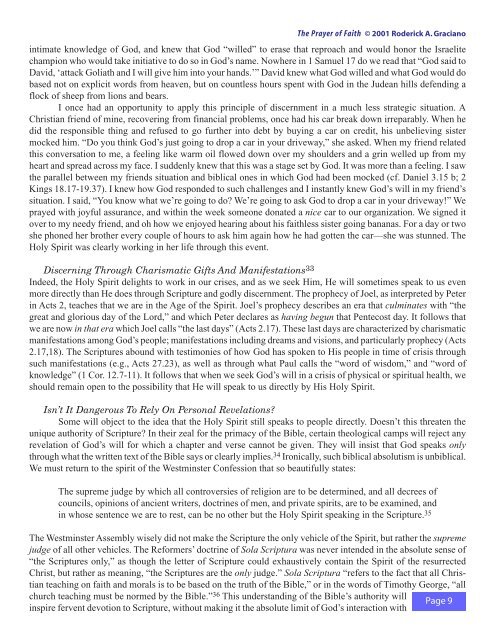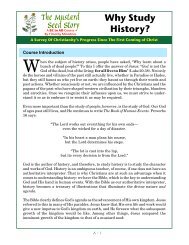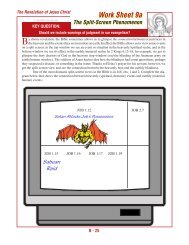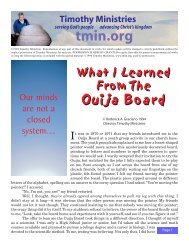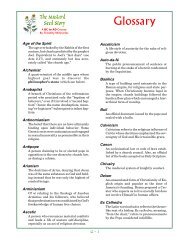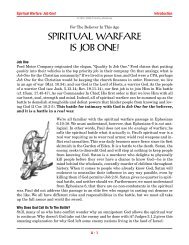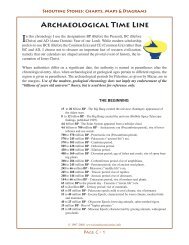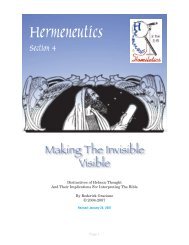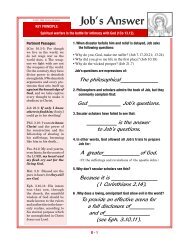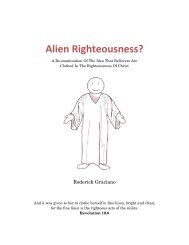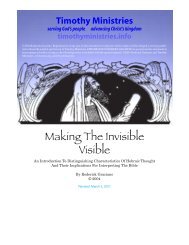The Prayer of Faith and Healing In James 5 - Timothy Ministries
The Prayer of Faith and Healing In James 5 - Timothy Ministries
The Prayer of Faith and Healing In James 5 - Timothy Ministries
Create successful ePaper yourself
Turn your PDF publications into a flip-book with our unique Google optimized e-Paper software.
<strong>The</strong> <strong>Prayer</strong> <strong>of</strong> <strong>Faith</strong> © 2001 Roderick A. Graciano<br />
intimate knowledge <strong>of</strong> God, <strong>and</strong> knew that God “willed” to erase that reproach <strong>and</strong> would honor the Israelite<br />
champion who would take initiative to do so in God’s name. Nowhere in 1 Samuel 17 do we read that “God said to<br />
David, ‘attack Goliath <strong>and</strong> I will give him into your h<strong>and</strong>s.’” David knew what God willed <strong>and</strong> what God would do<br />
based not on explicit words from heaven, but on countless hours spent with God in the Judean hills defending a<br />
flock <strong>of</strong> sheep from lions <strong>and</strong> bears.<br />
I once had an opportunity to apply this principle <strong>of</strong> discernment in a much less strategic situation. A<br />
Christian friend <strong>of</strong> mine, recovering from financial problems, once had his car break down irreparably. When he<br />
did the responsible thing <strong>and</strong> refused to go further into debt by buying a car on credit, his unbelieving sister<br />
mocked him. “Do you think God’s just going to drop a car in your driveway,” she asked. When my friend related<br />
this conversation to me, a feeling like warm oil flowed down over my shoulders <strong>and</strong> a grin welled up from my<br />
heart <strong>and</strong> spread across my face. I suddenly knew that this was a stage set by God. It was more than a feeling. I saw<br />
the parallel between my friends situation <strong>and</strong> biblical ones in which God had been mocked (cf. Daniel 3.15 b; 2<br />
Kings 18.17-19.37). I knew how God responded to such challenges <strong>and</strong> I instantly knew God’s will in my friend’s<br />
situation. I said, “You know what we’re going to do? We’re going to ask God to drop a car in your driveway!” We<br />
prayed with joyful assurance, <strong>and</strong> within the week someone donated a nice car to our organization. We signed it<br />
over to my needy friend, <strong>and</strong> oh how we enjoyed hearing about his faithless sister going bananas. For a day or two<br />
she phoned her brother every couple <strong>of</strong> hours to ask him again how he had gotten the car—she was stunned. <strong>The</strong><br />
Holy Spirit was clearly working in her life through this event.<br />
Discerning Through Charismatic Gifts And Manifestations 33<br />
<strong>In</strong>deed, the Holy Spirit delights to work in our crises, <strong>and</strong> as we seek Him, He will sometimes speak to us even<br />
more directly than He does through Scripture <strong>and</strong> godly discernment. <strong>The</strong> prophecy <strong>of</strong> Joel, as interpreted by Peter<br />
in Acts 2, teaches that we are in the Age <strong>of</strong> the Spirit. Joel’s prophecy describes an era that culminates with “the<br />
great <strong>and</strong> glorious day <strong>of</strong> the Lord,” <strong>and</strong> which Peter declares as having begun that Pentecost day. It follows that<br />
we are now in that era which Joel calls “the last days” (Acts 2.17). <strong>The</strong>se last days are characterized by charismatic<br />
manifestations among God’s people; manifestations including dreams <strong>and</strong> visions, <strong>and</strong> particularly prophecy (Acts<br />
2.17,18). <strong>The</strong> Scriptures abound with testimonies <strong>of</strong> how God has spoken to His people in time <strong>of</strong> crisis through<br />
such manifestations (e.g., Acts 27.23), as well as through what Paul calls the “word <strong>of</strong> wisdom,” <strong>and</strong> “word <strong>of</strong><br />
knowledge” (1 Cor. 12.7-11). It follows that when we seek God’s will in a crisis <strong>of</strong> physical or spiritual health, we<br />
should remain open to the possibility that He will speak to us directly by His Holy Spirit.<br />
Isn’t It Dangerous To Rely On Personal Revelations?<br />
Some will object to the idea that the Holy Spirit still speaks to people directly. Doesn’t this threaten the<br />
unique authority <strong>of</strong> Scripture? <strong>In</strong> their zeal for the primacy <strong>of</strong> the Bible, certain theological camps will reject any<br />
revelation <strong>of</strong> God’s will for which a chapter <strong>and</strong> verse cannot be given. <strong>The</strong>y will insist that God speaks only<br />
through what the written text <strong>of</strong> the Bible says or clearly implies. 34 Ironically, such biblical absolutism is unbiblical.<br />
We must return to the spirit <strong>of</strong> the Westminster Confession that so beautifully states:<br />
<strong>The</strong> supreme judge by which all controversies <strong>of</strong> religion are to be determined, <strong>and</strong> all decrees <strong>of</strong><br />
councils, opinions <strong>of</strong> ancient writers, doctrines <strong>of</strong> men, <strong>and</strong> private spirits, are to be examined, <strong>and</strong><br />
in whose sentence we are to rest, can be no other but the Holy Spirit speaking in the Scripture. 35<br />
<strong>The</strong> Westminster Assembly wisely did not make the Scripture the only vehicle <strong>of</strong> the Spirit, but rather the supreme<br />
judge <strong>of</strong> all other vehicles. <strong>The</strong> Reformers’ doctrine <strong>of</strong> Sola Scriptura was never intended in the absolute sense <strong>of</strong><br />
“the Scriptures only,” as though the letter <strong>of</strong> Scripture could exhaustively contain the Spirit <strong>of</strong> the resurrected<br />
Christ, but rather as meaning, “the Scriptures are the only judge.” Sola Scriptura “refers to the fact that all Christian<br />
teaching on faith <strong>and</strong> morals is to be based on the truth <strong>of</strong> the Bible,” or in the words <strong>of</strong> <strong>Timothy</strong> George, “all<br />
church teaching must be normed by the Bible.” 36 This underst<strong>and</strong>ing <strong>of</strong> the Bible’s authority will<br />
Page 9<br />
inspire fervent devotion to Scripture, without making it the absolute limit <strong>of</strong> God’s interaction with


